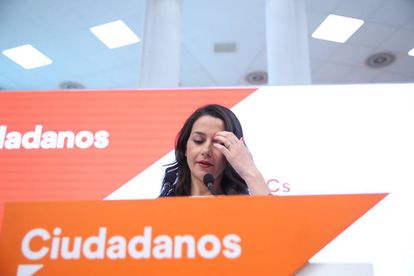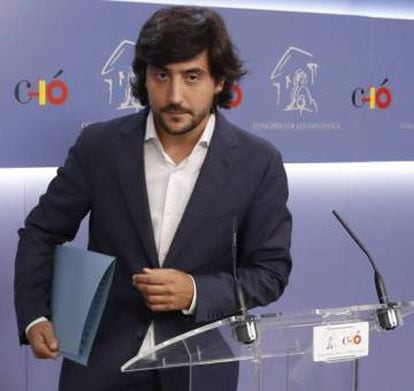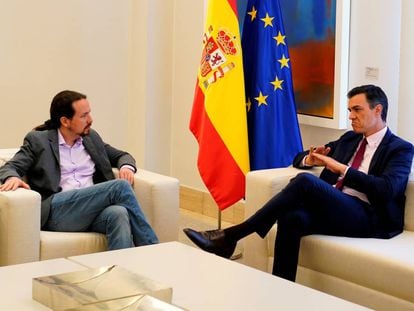Spain’s Ciudadanos party faces internal crisis over shift to the right
Three top officials have resigned in protest over the group’s dealings with the far-right Vox and refusal to support the Socialists

Two months after Spain held a general election, and with no new government in sight, the pressure is mounting for a cross-party deal that will spare Spaniards the aggravation of a fresh ballot in a country that has had three national elections since December 2015.
How can we build a liberal project in Spain if we are unable to confront the far right?
Toni Roldán, Ciudadanos spokesman for economic affairs
Acting Prime Minister Pedro Sánchez, of the Socialist Party (PSOE), earned the most seats on April 26, but still needs support to reach an overall majority and get back into office at a parliamentary vote that is expected to take place in the first half of July.
Now, a party that gained prominence during the economic crisis on a liberal reform agenda is facing an internal fracture over the dilemma of providing (or withholding) support for Sánchez.
Three leading members of Ciudadanos (Citizens) have resigned over their leader Albert Rivera’s point-blank refusal to back the Socialist leader: Toni Roldán, the party spokesman for economic affairs; Javier Nart, a member of the European Parliament; and Juan Vázquez, the party chief in Asturias.

In a critical farewell address, Roldán said that the party’s recent shift to the right, including its willingness to do deals with the far-right Vox, undermines its three original values: reform, regeneration and the battle against nationalism.
“How are we going to fight against the dynamics of confrontation between the reds [the left] and the blues [the right], like we came here to do, if we become blue ourselves?,” he asked. “How can we build a liberal project in Spain if we are unable to confront the far right?”
“Spain has a historic opportunity to build a stable government and lead liberal progress in Europe for the next 20 years. It would be a serious mistake to let this opportunity pass us by,” said Roldán, alluding to a PSOE-Ciudadanos alliance that would yield 180 seats in parliament, more than enough for an overall majority.
Critics lose vote
On Monday morning, at a tense meeting of Ciudadanos’ executive committee, critics of Rivera called a vote to reconsider the possibility of supporting Sánchez’s bid to form a government. But the critics lost with just four votes in their favor, while an overwhelming majority (24) expressed support for their leader’s hardline stand. There were three abstentions.
Luis Garicano, the party leader in the European Parliament, has now become the main representative of this critical faction. “I’m going to keep putting up a fight from within,” he told EL PAÍS.
Ciudadanos came in third at the general election with 57 seats, which added to Sánchez’s 123 would exceed the 176 required for an absolute majority. The anti-austerity Unidas Podemos has already pledged support for the acting PM, but its 42 lawmakers are not enough, and in the meantime both party leaders are locked in a debate over the exact nature of their cooperation.
A PSOE-Ciudadanos alliance that would yield 180 seats in parliament, more than the 176 needed for an overall majority
Ciudadanos, which started out as a Catalan non-nationalist party, jumped to national politics on a promise of reform based on liberal views – it is a member of the European Parliament’s liberal group ALDE, which has recently been rebranded Renew Europe.
But the party’s drift to the right – it has entered into governing deals with the Popular Party (PP) and with the far-right Vox – and Rivera’s refusal to support Sánchez have triggered criticism from within and without. Former French prime minister Manuel Valls, who ran for mayor of Barcelona with Ciudadanos, last week said in an interview that the party is betraying its liberal and progressive core values.
And on June 20, sources at the Elysée in Paris rejected claims made by Rivera to the effect that French President Emmanuel Macron had applauded Ciudadanos’ cross-party deals with the PP and Vox in Spain.
The party’s more progressive wing has been discussing this drift since December, when Ciudadanos and the PP accepted support from Vox in Andalusia to gain power in the southern region. But the change really took place before that, in May of last year, when Sánchez led a successful no-confidence motion that brought down the government of Mariano Rajoy, of the PP.
English version by Susana Urra.












































